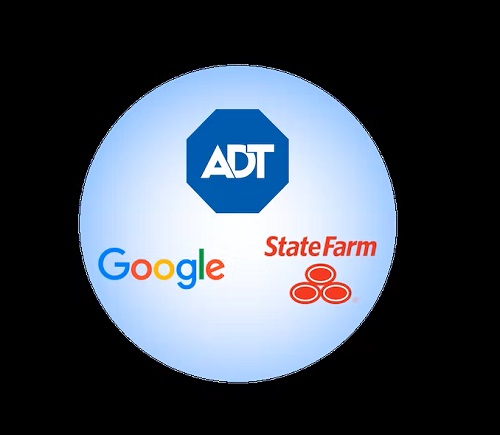
9.6.22 – SIW – By Paul Rothman
Analysts say partnership will have far-reaching implications in both the residential security and insurance industries
The residential security and home insurance industries have been natural partners for decades; however, on Tuesday that partnership took a massive step in a new direction, when State Farm announced it would acquire a 15% equity position in home and small business security giant ADT – a $1.5 billion total investment.
“This could mean something big for ADT, and in my opinion, this is even more sizeable than the Google relationship,” says industry M&A analyst Brian Ruttenbur, Managing Director of Imperial Capital. “This is a true loyalty program when you put that much skin in the game. That means this is going to be the go-to choice for insurance when selling to ADT customers, [or for security], when State Farm references customers to ADT.”
In addition to State Farm’s $1.2 billion stock investment in ADT ($9/share), the company says it has committed up to $300 million for an opportunity fund to support product innovation, technology and marketing that seeks to “differentiate and improve the customer experience for homeowners.”
“State Farm and ADT will design and deploy an innovative offering that combines security risk mitigation and smart home capabilities to revolutionize the customer experience,” ADT CEO Jim DeVries explained during a prepared statement to investors on Tuesday.
The Ever-Expanding Smart Home
The State Farm investment in ADT underscores a growing trend of adjacent industry expansion in the residential market. ADT has spearheaded this expansion with its highly publicized Google partnership; however, another prime example is the industry’s move into solar offerings, as evidenced by ADT, Vivint and Alarm.com.
“Security service providers are the ones who have created a sustainable smart home business model with RMR,” says Brad Russell, VP of Research for Interpret. “Now they want to add on adjacencies because security has been a very profitable business. A lot of them have been looking at the trifecta of security, home automation and energy. It is a three-way play where they can all share the same cloud platform and create value and efficiencies across the three services.”
All of this expansion to other areas of the smart home, of course, increases the chances that ADT and others will create stickier residential customers by bundling multiple services.
“Through partnering with State Farm, we will now have the opportunity to capture a greater share of market by using ADT Smart Home Security offerings to drive innovation in homeowners’ insurance with a first-of-its-kind integrated offering using smart home technology to detect and mitigate losses related to water, fire intrusion and other homeownership risks,” DeVries explained.
“ADT has this incredibly loyal base, and they decided they are going to sell them security products, home automation, solar – and now insurance. I see them selling more and more products to their existing loyal base, and it makes a lot of sense,” Ruttenbur says. “What ADT and Vivint and even down the road, Brinks will be doing, is using their existing customer base to sell more products through that channel.”
This expansion to other areas can also apply to vehicles, where ADT announced a partnership with Ford in January that will reportedly bring a vehicle security offering to fruition in 2023. ADT also has announced personal security services for riders and drivers with Lyft and, just a week ago launched a similar partnership with Uber.
A Revolution for Insurance Providers?
Home security providers have long partnered with insurance companies to drive sales and policy discounts for homeowners. Recent examples include a USAA DIY partnership with Resideo launched last year, last month’s announcement that Selective Insurance partnered with DIY provider SimpliSafe, and in June, Hippo Insurance Services, which serves 39 U.S. states, announced a partnership with Amazon Ring.
Russell explains that State Farm’s equity play is far more impactful; in fact, it represents a potential revolution for the insurance industry in the smart home space.
“This is really interesting, because overnight State Farm gets not just a partner, but they get access to data,” he says. “One of the things in the insurance space that has really slowed down [technology] adoption is that regulators require massive amounts of data proving the validity and efficacy of smart home devices. Something obvious like water leak detectors can mitigate an average water damage claim of $8,000, but insurance companies still haven’t been able to do the math for their actuaries because they have needed hundreds of thousands of households to prove the numbers.
“Now, [State Farm] is going to instantly have thousands of ADT homeowners who have smart leak detectors in place, and now they can correlate those with State Farm customers,” Russell continues. “ [State Farm] can then go to regulators and tell them they want to create new smart home offerings, where these devices and services can be bundled with a premium. That requires regulatory approval, and no insurance company has really been able to have that conversation because they have not invested deeply enough to get the data.”
Thus, the largest insurance provider in the United States, State Farm – through its ADT partnership – is poised to start a revolution in the insurance industry, and that could have far-reaching implications back to the security industry.
“It is going be really interesting, now that the biggest domino [State Farm] has fallen,” Russell says. “How fast are Allstate and the other top 5-10 insurance providers going to follow? To compete, those companies are going to have to develop partnerships of some kind in order to develop ‘smart home insurance policies’ – where they bundle the hardware and services with a premium.”
Paul Rothman is Editor-in-Chief of Security Business magazine, a print publication for executives at security integrator and consultant firms powered by SecurityInfoWatch.com.
